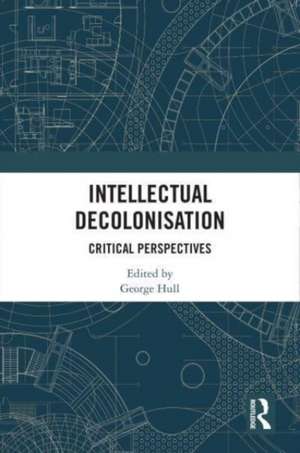Intellectual Decolonisation: Critical Perspectives
Editat de George Hullen Limba Engleză Hardback – 18 oct 2024
Contemporary calls to decolonise focus less on politico-economic relations between states, more on culture and ideas. Sometimes museums are the target, sometimes universities or academic disciplines, sometimes entire legal systems. Commentators and activists speak out for, others against, intellectual decolonisation: decolonisation of the mind. But what is the colonisation which intellectual decolonisation undoes? Under what circumstances can inculcation or acceptance of ideas constitute colonialism? As this book demonstrates, advocates of intellectual decolonisation give very different—indeed, incompatible—answers to these questions. Critically examining conceptualisations of decolonisation spanning a century and four continents, the book explores what is at stake in the choice between these theoretical alternatives. Some see the aim of decolonisation as truth, via the removal of distorting effects of power and bias. Others troublingly subordinate truth and knowledge to ethnic or regional identity, potentially paving the way for culturally authoritarian politics.
Intellectual Decolonisation: Critical Perspectives is an indispensable resource for teachers, students and scholars seeking to deepen their understanding of debates about decolonisation of the mind. Individual chapters will interest researchers of the new right-wing, ethnonationalist political ideologies emerging in Europe, Asia and Africa. Originally published as a special issue of Social Dynamics, this book is also a guide for anyone wondering what decolonisation is all about.
Preț: 767.01 lei
Preț vechi: 1029.08 lei
-25% Nou
Puncte Express: 1151
Preț estimativ în valută:
146.76€ • 153.25$ • 121.19£
146.76€ • 153.25$ • 121.19£
Carte tipărită la comandă
Livrare economică 16-30 aprilie
Preluare comenzi: 021 569.72.76
Specificații
ISBN-13: 9781032853598
ISBN-10: 103285359X
Pagini: 244
Ilustrații: 2
Dimensiuni: 210 x 297 mm
Greutate: 0.61 kg
Ediția:1
Editura: Taylor & Francis
Colecția Routledge
Locul publicării:Oxford, United Kingdom
ISBN-10: 103285359X
Pagini: 244
Ilustrații: 2
Dimensiuni: 210 x 297 mm
Greutate: 0.61 kg
Ediția:1
Editura: Taylor & Francis
Colecția Routledge
Locul publicării:Oxford, United Kingdom
Public țintă
Postgraduate, Undergraduate Advanced, and Undergraduate CoreCuprins
1. Varieties of intellectual decolonisation: an introduction 2. From “dependency” to “decoloniality”? The enduring relevance of materialist political economy and the problems of a “decolonial” alternative 3. The problem of epistemological critique in contemporary Decolonial theory 4. Is being itself colonial? 5. “That other me, down and dreaming”: an animal perspective critique of decoloniality theory 6. Decolonising Sinology: on Sinology’s weaponisation of the discourse of race 7. Whither epistemic decolonisation? How to make experiences a source of moral justification 8. The decolonisation of the mind and history as an academic discipline 9. Decolonisation in Africa: love or litigation? Mandela as moral capital 10. Is decolonisation Africanisation? The politics of belonging in the truly African university 11. Intellectual decolonisation and the danger of epistemic closure: the need for a critical decolonial theory 12. My decoloniality is not your decoloniality: the new multiverse – an opinion piece 13. Decoloniality and right-wing nationalism in India: the case of J Sai Deepak
Recenzii
With Intellectual Decolonisation: Critical Perspectives, editor and author George Hull has furnished an indispensable resource for both a broad understanding and radical critique of the identitarian logic and the ethno-nationalist and authoritarian dangers of Decoloniality Theory. Comprehensive and fair-minded, this is ideology-critique at its vital best.
Professor Emeritus Neil Larsen
Department of Comparative Literature, University of California, Davis
Author, ‘The Jargon of Decoloniality’
The debate on university and intellectual decolonisation is long on anger and emotion and insufficiently grounded in theoretical reflection and critical scrutiny. Too many advocates of decolonisation have been allowed to dabble in crude essentialist understandings of identity without academic challenge, resulting in a discourse that is too often immersed in racial and ethnic tropes that can easily be harnessed for the political cause of Fascism or its variants. There is also insufficient attention paid in this debate to the transnational dynamics of colonialism and decoloniality, with the result that it again can easily be harnessed to serve the cause of relatively privileged groups within national settings. Here is a book that lays this bare and exposes the philosophical inadequacies of certain theoretical traditions and the strengths of others. A necessary read for all those interested in the study of decolonisation and the agenda of building inclusive and transformed universities.
Professor Adam Habib
Vice-chancellor, SOAS, University of London
Professor Emeritus Neil Larsen
Department of Comparative Literature, University of California, Davis
Author, ‘The Jargon of Decoloniality’
The debate on university and intellectual decolonisation is long on anger and emotion and insufficiently grounded in theoretical reflection and critical scrutiny. Too many advocates of decolonisation have been allowed to dabble in crude essentialist understandings of identity without academic challenge, resulting in a discourse that is too often immersed in racial and ethnic tropes that can easily be harnessed for the political cause of Fascism or its variants. There is also insufficient attention paid in this debate to the transnational dynamics of colonialism and decoloniality, with the result that it again can easily be harnessed to serve the cause of relatively privileged groups within national settings. Here is a book that lays this bare and exposes the philosophical inadequacies of certain theoretical traditions and the strengths of others. A necessary read for all those interested in the study of decolonisation and the agenda of building inclusive and transformed universities.
Professor Adam Habib
Vice-chancellor, SOAS, University of London
Notă biografică
George Hull is Senior Lecturer in Philosophy at the University of Cape Town, South Africa. He writes on social and political philosophy, political ideologies, and intellectual history. He is the editor of Debating African Philosophy: Perspectives on Identity, Decolonial Ethics and Comparative Philosophy (2019).
Descriere
This book puts contemporary calls for decolonisation in context. Featuring an interdisciplinary team of scholars from around the world, the book explores and critically assesses the diverse theoretical visions which inform calls for decolonisation of the mind today.
